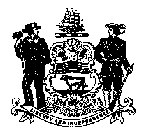 
One of Delaware's " Colonial Leaders "

( All web links on this page are in "Bright Blue" ) " Jacob Broom " was born in Wilmington, Delaware on October 17, 1752, the eldest son of a blacksmith who prospered in farming.
The young " Broom " was educated at home and probably at the local Old Academy in Wilmingon. Although he followed his father into farming and also studied surveying, he was to make his career primarily in mercantile pursuits, including shipping and the import trade, and in real estate.
He married " Rachel Pierce " who was the daughter of Robert and Elizabeth Pierce of Greenville, New Castle County, Delaware in 1773 and together they had eight children.
" Broom " was not necessarily a distinguished patriot. His only recorded service was the preparation of maps for General Washington before the Battle of Brandywine.
In 1776, at the age of 24, " Broom " became assistant Burgess of Wilmington, Delaware. Over the next several decades, he held that office six times and that of Chief Burgess four times, as well as those of Borough Assessor, President fo the city " street regulators ", and justice of the peace for New Castle County.
" Broom " was a member of the State Legislature in 1784-86 and in 1788, during which time he was chosen as a delegate to the Annapolis Convention, but he did not attend.
He was a member of the Delaware delegation to the Constitution Convention in 1787 and was noted as never missing a session and spoke on several occassions, but his role was only a minor one. He signed the document for Delaware along with George Read, Gunning Bedford Jr., John Dickinson and Richard Bassett.
After the Convention, " Broom " returned to Wilmington, where in 1795 he erected a home near the Brandywine River on the outskirts of the city.
He was the first Postmaster of Wilmington (1790-92) and continued to hold various local offices and to participate in a varity of economic endeavors.
For many years, he chaired the board of directors of Wilmington's Delaware Bank. He also operated a cotton mill, as well as a machine shop that produced and repaired mill machinery. He was involved, too, in an unsuccessful scheme to mine bog iron ore. A further interest was internal improvements: toll roads, canals, and bridges.
" Broom " also found time for philanthropic and religious activities. He served on the board of trustees of the College of Wilmington and as a lay leader at the Old Swedes Church.
" Jacob Broom " died on April 25, 1810 at the age of 58 while in Philadelphia on business. He was interred in Philadelphia at the Christ Episcopal Church and Churchyard.
and place of " Jacob Broom's " Burial : 




Email any questions or comments to:
|

